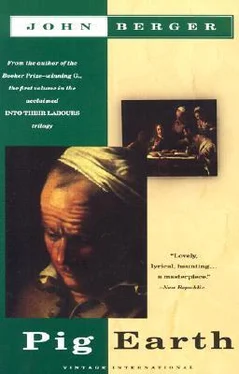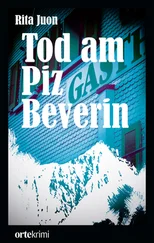They’ve come! said one of them, invisibly.
Who in God’s name?
The steam turned wet on their faces.
The inspectors!
In the white cloud they all laughed at this joke for the inspectors had made their inspection only two days before.
When the steam dispersed they saw Mathieu holding up, with the handle of his hammer, a string of glistening black sausages.
Hand me a plate! he shouted.
Emile, who was born in 1897, stepped forward with a plate, and untied the tape which held the fur flaps of his cap over his ears, preparatory to eating.
Sausages, the colour of black cherries, cooked in gnôle , warm the heart because they are hot, arouse because they are salty, comfort because they taste of wood smoke, confer strength because they are meat, and release dreams because they are saturated with alcohol. Sheltered between the tarpaulin and engine the men ate. As they ate, the collars of their coats touching their cheeks, and the juice running out of the corners of their mouths, they grunted with pleasure.
Amen! said Emile.
Half-way through the morning, it was Marcel’s turn to empty his sacks of marc into the vases. He had twelve sacks, enough to fill the three vases twice. Once more the bull engine started its work of transformation.
He had already filled three demijohns with gnôle when an old woman flung open a window in the nearest house and began to yell and wave her arms.
It’s Marie, muttered Emile, she never lets me stay.
Reluctantly Emile left the engine and walked with his stick across the snow to his house. No sooner had he entered than he was out again waving his stick.
The men by the engine waved back at him, laughing, and continued to listen to the sounds of the copper bull. Soon they would say Amen again.
Mathieu! Mathieu! shouted Emile. Only when he had reached the engine did anybody take any notice of what the old man was trying to say.
The inspectors are coming! he gasped.
How do you know?
The baker telephoned. He said they drove past half an hour ago. The line was not working. Only just got through.
Everybody turned to Marcel.
How many litres have I got, a hundred? he asked.
I’m afraid so! said Mathieu.
Afraid so! My trees have never given so much as this year. Three thousand litres of cider! It’s the best year I can remember. Last year there were so few apples, it wasn’t worth pressing them. And you say, you are afraid so!
Marcel, don’t play the fool! There’s no way of fixing the papers if it’s still in the vases.
The buggers even come in a snowstorm, whispered Emile.
We hide nothing, commanded Marcel.
Mathieu looked at him pityingly.
They came the day before yesterday, said the youngest assistant.
A car stopped on the bridge.
The buggers have come back again!
Two men got out, wearing city overcoats, spotless green Wellington boots and, on their heads, tartan berets with woollen pompoms.
Good morning!
The chief inspector knew better than to hold out his hand. The younger one did so and nobody took it.
Gentlemen, boomed Emile, what have they always taxed? They tax whatever gives pleasure to the poor. Salt, tobacco, gnôle! the poor have no right to pleasures. If they had, it would discourage the rich!
The chief inspector deliberately ignored the old man. I don’t suppose you expected us back so soon, he said to Mathieu.
There were thirty distilling engines in the region, and if the two inspectors did their rounds regularly, one could count on a month between visits.
It was the little question of the emergency tap which brought us back so soon.
The chief inspector spoke as if he were explaining to children, then, removing his gloves, he examined the tap of the serpentine condenser, put a finger to it and smelt the tip of his finger.
Old goat shit! muttered Emile.
The inspectors were like actors in a sinister theatre, sinister because everything they did was addressed to an authority who was not present.
You’ve drawn some off, said the inspector folding his arms across his chest.
What’s been drawn off, said Marcel, nodding at his demijohns, is there!
Are they yours?
They are mine.
And the paper form?
The paper form is yours.
Have you filled it in?
How could I? I don’t know how many litres my marc will yield yet.
Are all three vases yours?
Yes, they are mine.
They are going to make a little more than the statutory twenty litres, aren’t they? The chief inspector smiled at the absent authority.
Mathieu pretended to study the dials of the boiler.
A good year for apples, said the young inspector, hoping to be affable.
The chief took a pen out of his pocket.
Do you know what this means? Marcel addressed the question as if to the snow. His gnôle was running out of the beak into the copper bucket which he had just emptied.
It means I’m going to have to pay, pay money for my own produce!
He spoke as solemnly and slowly as a priest saying a prayer over an open grave.
Marcel’s marc yielded one hundred and sixty litres of eau-de-vie at fifty per cent, which meant that he had to pay on eighty-six litres the sum of two hundred and six thousand, four hundred francs: half the price of a four-year-old mare.
On his way home snow was blowing into Marcel’s and Gui-Gui’s eyes. He said afterwards that, as he rode in the cart, all explanations escaped him. All he could see was his next action drawing closer and becoming larger.
He unharnessed Gui-Gui and led her into the stable. The horse’s stall, the large table in the kitchen, the ceiling-high cupboard where the gnôle bottle was kept, the cellar door — because the bottle was empty and he had to go and fill it from the demijohn — the wardrobe in the bedroom from which he took his shotgun, the bed on which he sat to change his boots, these wooden things, so solid to the touch, worn and polished, protected from the snow, placed in the house before he was born, built with wood that came from the forest which, through the window, was now no more than a darkness behind the falling snow, reminded him with a force, such as he had never experienced before, of all the dead who were his family and who had lived and worked in the same farm. He poured out a glass of gnôle for himself. The feeling came back into his feet. His ancestors were in the house with him.
At midday he was standing on the side of the road which led down from the hamlet where the distillers were still working. He had changed his leather jacket and wore an overcoat and cap. He waited for half an hour. For the Prosecution this half hour was to be proof that his action was premeditated.
At last a car came slowly round the corner. Standing in the middle of the road, Marcel waved his arms, the shotgun hidden under his overcoat. The car stopped.
The chief inspector wound down his snow-covered window.
What is it? he asked.
Marcel uncovered the barrels of his shotgun.
A good year for apples! he said.
The windscreen wipers stopped. There was only the sound of the engine ticking over.
Give me the ignition key. Thank you. Now ask your colleague to get out and stand by the headlights. Tell him to shut the door. Good. Wait a moment, let’s see. He and I will get into the back of the car. And you will drive where I tell you.
This hold-up in the snow, said the chief inspector under cross-examination by the Prosecution, was as terrifying as an encounter with the Yeti.
The judge asked what a Yeti was. The Yeti is an anthropoid monster who lives in the Himalayas.
After a few minutes Marcel told the inspector to stop the car. The pine trees were weighed down with snow, and on the left of the road was a steep escarpment.
Читать дальше












